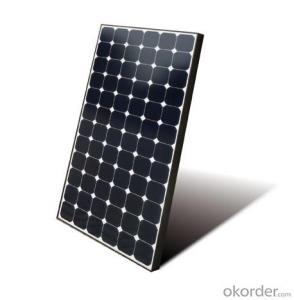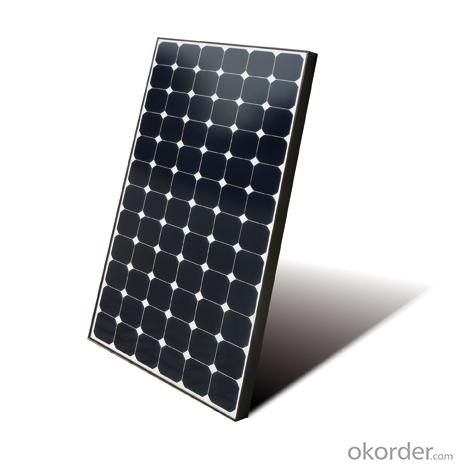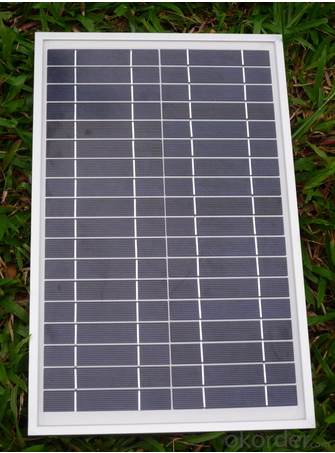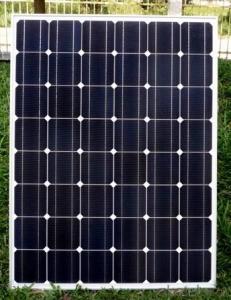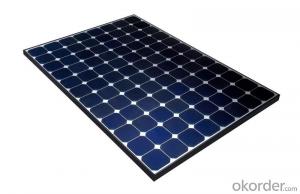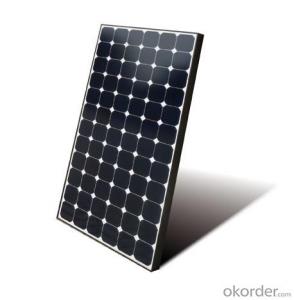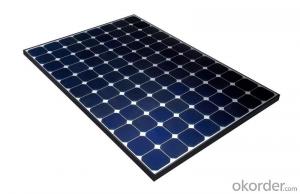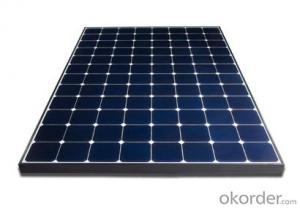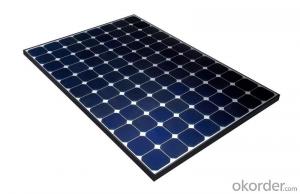Solar Panels 100 Watt CNBM Poly 165W Solar Panel with TUV UL CE Certificate for Residential
- Loading Port:
- Shanghai
- Payment Terms:
- TT OR LC
- Min Order Qty:
- 100 watt
- Supply Capability:
- 1000 watt/month
OKorder Service Pledge
OKorder Financial Service
You Might Also Like
Specification
CNBM Poly 160W Solar Panel with TUV UL CE Certificate For Residential
Introduction
This is a kit using for factory and storage field. This product is a higher output version with stable power and we guarantee you for 20years.
Each module is rated by its DC output power under standard test conditions, and typically ranges from 100 to 365 watts. The efficiency of a module determines the area of a module given the same rated output – an 8% efficient 230 watt module will have twice the area of a 16% efficient 230 watt module. There are a few solar panels available that are exceeding 19% efficiency. A single solar module can produce only a limited amount of power; most installations contain multiple modules. A photovoltaic system typically includes a panel or an array of solar modules, a solar inverter, and sometimes a battery and/or solar tracker and interconnection wiring.
Solar modules use light energy (photons) from the sun to generate electricity through the photovoltaic effect. The majority of modules use wafer-based crystalline silicon cells or thin-film cells based on cadmium telluride or silicon. The structural (load carrying) member of a module can either be the top layer or the back layer. Cells must also be protected from mechanical damage and moisture. Most solar modules are rigid, but semi-flexible ones are available, based on thin-film cells.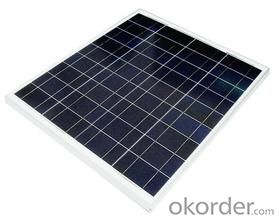
Suggested application
Home lighting business lighting,
Garden lighting, pavement lighting
Farmer household lighting
Decorative water pump
Traffic signal lighting
Industry area
Business area
Solar Power Plant
Product feature
Modules are made of Monocrystalline or Polycrystalline Silicon cell.
Materials and color of the solar panel frame: Clear anodized aluminum alloy type 6063T5 Universal frame; Silver-white color;
The output connection gathers the coupling: Selects conforms to the IEC-612615; 2005, class II, IEC61730 international standard; Airtight waterproofing binding clamp;
Module seal structure: The surface is thick, the high diaphanous rate armored glass with solar cell board special-purpose 3.2mm becomes after the high temperature lamination craft. The back selects has waterproof and anti- aged performance fine TPT materials. The entire block battery board has, the waterproofing, the anti- aging airtight and so on the fine performance;
Power tolerance: +/-3%
Packaging
International standard cartons (according to the requirements of customers)
- Q: Lower solar panel/wind turbine prices allow wider applications, hence a great help to a greener mother earth!
- Wind okorder / For the period 87 - 200: Low Risk = bonds = .8% ROI High Risk = stocks = 5.4% ROI For the period 982 - 200: Low Risk = bonds = 5.% ROI High Risk = stocks = 6.% ROI
- Q: How do solar panels affect the resale value of a property?
- Solar panels can have a positive impact on the resale value of a property. Studies have shown that homes equipped with solar panels tend to sell for a higher price and at a faster rate compared to homes without solar. This is because buyers are increasingly interested in energy-efficient and sustainable features. Additionally, solar panels can help reduce energy costs, making the property more attractive to potential buyers.
- Q: Can solar panels be installed on a car or electric vehicle?
- Yes, solar panels can be installed on a car or electric vehicle. These panels can harness sunlight and convert it into electricity to help power the vehicle's battery or ancillary systems. While the amount of energy generated may be limited, solar panels on cars can be a sustainable and environmentally friendly addition, providing some extra charging capability and reducing reliance on traditional charging methods.
- Q: Alright my family and i are buying a new home in Bradford,Ontario, we we thinking about solar panels and had a couple questions:. how much are they each?2. how many will we need to power a single family home(4 ppl)3. where can we find them in ontario?4.how much money do they really save you?5.what kind of energy do they providfe you withand other basic info or a website i can check out would be great!thanks in advance!
- I have a system that was installed last year. I have 20 panels which provide me with about 75% of my electricity. I do use less electricity than the average home. I use an average of 45 kwh in the summer, my neighbor uses more than double that. I paid $26K for the system, but I got a $0K rebate from my utility and the US gives a fed. tax credit. I am saving about $2K per year, so it will take just over 6 years to break even. I also have what I think is called net metering, my utility allows my meter to run backwards when I generate more energy than I use, so pretty much the entire time the sun is out in the summer. Having energy efficient appliances, reducing standby energy and using conservative climate control really helps keep my usage down. Weather striping, insulation and clean well maintained systems all help as well.
- Q: Can solar panels be installed on concert venues or music festivals?
- Yes, solar panels can be installed on concert venues or music festivals. In fact, many event organizers are increasingly adopting solar energy to power their events, reducing their carbon footprint and promoting sustainability. Solar panels can be installed on rooftops, parking lots, or even as temporary structures to generate clean and renewable energy for the venue's electricity needs.
- Q: Can solar panels be installed on a library or educational institution?
- Yes, solar panels can be installed on a library or educational institution. In fact, installing solar panels on such buildings is a great way to promote renewable energy and reduce carbon emissions. It not only helps to lower electricity bills but also serves as an educational tool, teaching students and visitors about the benefits of solar power and sustainable living.
- Q: Can solar panels be installed on a remote island or location?
- Yes, solar panels can be installed on a remote island or location. Solar panels require sunlight to generate electricity, so as long as there is adequate sunlight in the area, they can be installed. Remote islands or locations often benefit from solar panel installations as they provide a clean and renewable source of energy without the need for extensive infrastructure or reliance on fossil fuels.
- Q: I have had this 2v portable Solar Panel for my apartment for awhile. Only problem is that I have no balcony and I can barely get enough sun to use it with my Cobra 450 400-800 watt outlet converter. Can someone advise me a better method to use these? Like do I have to get more 2v solar panels? I have a small apartment and use it on one window. Also is it possible for me to buy a portable storage tank to store the energy gathered from the sun by the solar panel?
- Your portable panel is at most a few amps at 2 volts nominal.Hopefully you have a higher voltage than this to enable you to charge a 2 volt battery. This takes about 3.3-3.6 volts. Your converter will function until a battery reaches about 0.5 volts (drop out voltages vary greatly). A deep discharge marine batttery will be the best bet for storage but usually more expensive than a regular battery. If your resources are limited, you might try from these cheaper sources. Insterstate battery stores usually have blems at a lower price. These are totally functional batteries but have surface imperfections that the manufacturer doesn't want his name on. Also check you local junkyard or towing service. They are often asked by insurance carriers to junk a car which has been wrecked. Many times the batteries are still perfect. They sell these for what they can get for them. Look for one from a SUV with lots of power options. Often kids cars have outlandish stereo systems requiring heaavy current batteries. These are a good find. Consider getting a solar power management system for charging your system. It will limit your charging voltage so you do not float a 2 volt battery above 4 volts where it would slowly destroy it.
- Q: How do solar panels generate electricity?
- Solar panels generate electricity through the photovoltaic effect, where sunlight is converted into electricity. When sunlight hits the solar panels, the photons in the sunlight knock electrons loose from their atoms, generating an electric current. This current is then captured and converted into usable electricity for powering homes and businesses.
- Q: i just took a trip to florida, they are cutting down anything that doesnt float and putting up buildings. Most of these cost a bundle, bill gates may pay cash for them, but most people will have many payments. Since pools, satellite dishes, and docks if near the water seem to be standard issue, why not a couple solar panels and water heater. It is florida after all, and if you are allready paying a half million or so for a house, what is another 0k gonna mean to you. Why dont they make it mandatory to include these on all new housing and condos and businesses. With that many the price would come down quickly and pay for itself long before the house is payed off and/or florida is flooded due to global warming.
- Wow that is a great idea! We have so many old houses around here that no one lives in and they are building houses on 2 /2 acre lots. That seems like a waste of land. There is this construction company that is building town houses with solar panel roofs and the upstairs is the bedrooms and the down stairs is the living area so that it takes a very small lot. 40 x 60 even has room for a car port and small backyard. My friend has one and he made it low cost so everyone has a chance at home ownership. They are being build where he is buying the land and tearing down old houses and puting up these town houses. Makes the town look better and cleans up otherwise bad looking neighborhoods. If they can do that here why not all over? By building up she was telling us it cost less for foundation and roofing which is the most expensive. It is 900' sq ft. 2 bdrm bath. Let's go back to the time when people didn't have to have these 6000 sq.ft houses with 5 acre lots.
Send your message to us
Solar Panels 100 Watt CNBM Poly 165W Solar Panel with TUV UL CE Certificate for Residential
- Loading Port:
- Shanghai
- Payment Terms:
- TT OR LC
- Min Order Qty:
- 100 watt
- Supply Capability:
- 1000 watt/month
OKorder Service Pledge
OKorder Financial Service
Similar products
Hot products
Hot Searches
